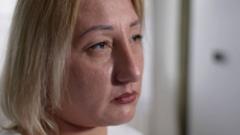Svitlana, a 42-year-old woman from Kyiv, has faced an excruciating two-year wait for her husband Dima, an army medic captured by Russian forces during the ongoing conflict in Ukraine. Recently, she received a chilling phone call from a man introducing himself as Dmitry, who spoke with a Russian accent. The call turned into an ordeal of dark choices as Dmitry proposed acts of sabotage against her own country to secure her husband's better treatment in prison, insisting that treachery could lead to a possible early release for him.
"Your husband is being tortured, and it's your fault," Dmitry threatened during their conversations, as Svitlana recorded the calls in accordance with advice from the Ukrainian Security Service (SBU). Despite the looming fear for Dima’s safety, Svitlana remained resolute in her loyalty. She recalled the guidance from the authorities to stall any coercive demands and report suspicious activities. Relaying her discussions with Dmitry, she hesitated but ultimately informed the SBU, who instructed her to maintain the ruse while they investigated.
The ordeal became increasingly intense, filled with detailed instructions from Dmitry on committing arson against military assets. He promised potential rewards, like a phone call or a care package for her husband, should she comply. Yet, these offers were steeped in the grim reality of espionage, where Svitlana remained aware of the true stakes. As threats escalated, the emotional burden weighed heavily on her, invoking a constant tug-of-war between despair and hope.
The SBU reinforced the dangers of cooperating with Russian agents, clarifying that such actions could be classified as treason, punishable by severe penalties, including life imprisonment. The pressures on families of prisoners of war prompted the SBU to seek cooperation and support as a means to shield them from being manipulated.
Petro Yatsenko from the Ukrainian military revealed that approximately 50% of the families of prisoners of war are approached by Russian agents, targeting their vulnerability. He elucidated that while some might think their actions could save loved ones, they often complicate negotiations and endanger many more.
As the complexities and challenges of the war endure, the Russian government, in a counter-allegation, denied using prisoners' families as bargaining chips. They refuted claims made by Ukraine regarding the humane treatment of captured soldiers, casting the allegations as unfounded. Meanwhile, Svitlana’s husband, Dima, eventually returned home just three months ago, unharmed and unpunished for her steadfast refusal to yield.
Reflecting on their reunion, Svitlana expressed immense relief and profound joy, stating, “It felt like I had snatched my love from the jaws of death.” Dima's shock upon hearing about the threats only underscored the psychological toll such manipulation inflicts on families during wartime. In the end, Svitlana's experience stands as a testament to resilience among those caught in a harrowing conflict, embodying a poignant narrative of devotion and patriotism in the face of adversity.





















